|
|
|
Sort Order |
|
|
|
Items / Page
|
|
|
|
|
|
|
| Srl | Item |
| 1 |
ID:
146985
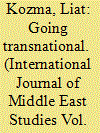

|
|
|
|
|
| Summary/Abstract |
Middle East gender studies is a lively and fascinating field. With two very different journals (Hawwa and Journal of Middle East Women Studies) and dozens of panels at the Middle East Studies Association Annual Conference and the World Congress for Middle Eastern Studies, we have come a long way over the last two decades. Women's, queer, and masculinity studies are now part of how we understand gender studies in the region. Middle East gender studies does, however, remain marginal in two fields—Middle East studies and gender studies. It is normally assigned to the end of a Middle East studies conference (“and gender”), or, conversely, to the end of a gender studies conference or edited volume (“and elsewhere”). But can a discussion of technology or World War I in the modern Middle East weave in insights gained from gender or queer studies? And can a discussion of women's movements or women's labor incorporate what we know about the Middle East? I believe that more can be done to mainstream gender in Middle East studies, and to mainstream the Middle East in gender studies. Transnational history is a particularly promising direction for this endeavor.
|
|
|
|
|
|
|
|
|
|
|
|
|
|
|
|
| 2 |
ID:
162299
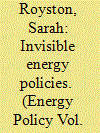

|
|
|
|
|
| Summary/Abstract |
This article makes the case for a new and ambitious research and governance agenda for energy demand reduction. It argues that existing ‘demand-side’ approaches focused on promoting technological efficiency and informed individual consumption are unlikely to be adequate to achieving future carbon emissions reduction goals; it points out that very little attention has so far been paid to the impacts of non-energy policies on energy demand; and it submits that a much fuller integration of energy demand questions into policy is required. It advances a general framework, supported by illustrative examples, for understanding the impacts of ‘non-energy’ policies on energy demand. It reflects on why these connections have been so little explored and addressed within energy research and policy. And it argues that, for all their current ‘invisibility’, there is nonetheless scope for increasing the visibility of, and in effect ‘mainstreaming’, energy demand reduction objectives within other policy areas. Researchers and policymakers, we contend, need to develop better understandings of how energy demand might be made governable, and how non-energy policies might be revised, alone and in combination, to help steer long-term changes in energy demand.
|
|
|
|
|
|
|
|
|
|
|
|
|
|
|
|
| 3 |
ID:
103674
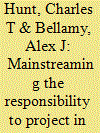

|
|
|
| 4 |
ID:
155117
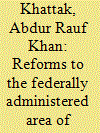

|
|
|
|
|
| Summary/Abstract |
In March 2017, Pakistan formally took the decision to begin a process of incorporating the Federally Administered Tribal Territories into the framework of regular Pakistani law. This article offers an overview of the historical system of governance of the Tribal territories, along with a discussion of the development of the recent reforms and their prospects for success.
|
|
|
|
|
|
|
|
|
|
|
|
|
|
|
|
| 5 |
ID:
082688
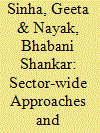

|
|
|
|
|
| Publication |
2008.
|
| Summary/Abstract |
The article aims to provide a brief overview of the gender perspective in the Sector-wide Approaches (SWAp) and its ability to integrate gender equality concerns in education in Ghana. This approach has been strategically adopted by various aid agencies as an effective and efficient tool to ensure mainstreaming gender in different fields. In this article, we will try to analyse some of the ways in which mainstreaming gender has taken place through SWAp in the field of education in Ghana. It analyses the extent to which SWAp as a strategy has been able to mainstream gender in education in Ghana.
|
|
|
|
|
|
|
|
|
|
|
|
|
|
|
|
| 6 |
ID:
143896
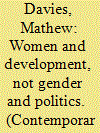

|
|
|
|
|
| Summary/Abstract |
While questions have been asked about whether ASEAN could, or even should, adopt the United Nation’s Women Peace and Security (WPS) agenda, this article is the first to ask why it has not done so already. ASEAN’s strong engagement with gender issues beyond the WPS agenda, together with the pressing need to address conflict and security concerns within Southeast Asia, make this an absence that requires an explanation. I argue that the usual explanatory framework deployed to account for ASEAN “not doing” something — the weaknesses caused by consensus, unanimity and the “ASEAN Way” — do not explain the absence of the WPS agenda; ASEAN’s engagement with gender is too advanced for the “it does not want to” explanation to hold. Instead, I locate the failure to engage with the WPS agenda in a particular elite understanding of women as both non-political and vehicles for the realization of economic and social well-being. This elite mindset, which both differs from that found within the ASEAN institutions dedicated to gender issues and which serves as the key driver of ASEAN’s institutional design, has retarded engagement with WPS because it stands at odds with the active political agency of women that WPS promotes. Revealing this reason for ASEAN’s failure to institutionalize WPS provides a way to consider the future of this important set of norms. I argue that efforts to mainstream WPS must take account of this ingrained framing of women as apolitical if they are to be successful.
|
|
|
|
|
|
|
|
|
|
|
|
|
|
|
|
|
|
|
|
|